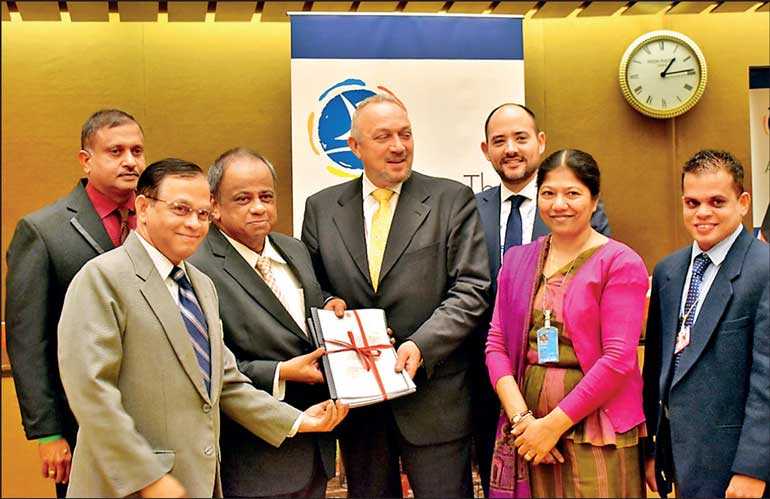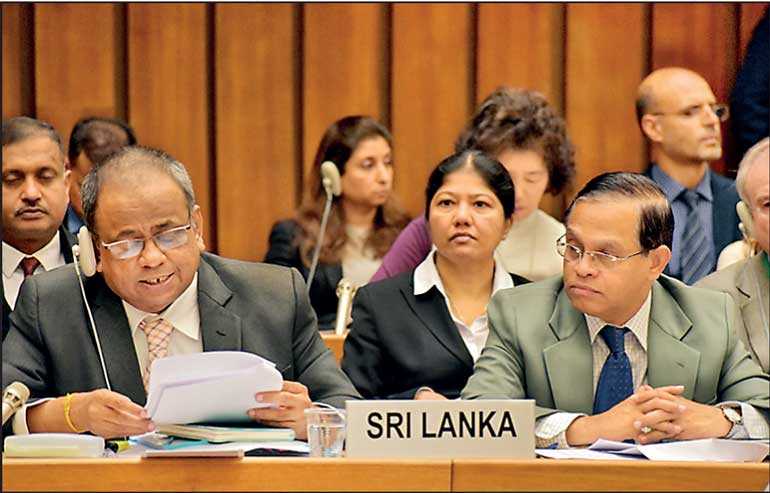Sunday Feb 22, 2026
Sunday Feb 22, 2026
Friday, 7 December 2018 00:00 - - {{hitsCtrl.values.hits}}



Sri Lanka acceded to the Mine Ban Convention, very well known as the Ottawa Convention, in 2017 which came into force from 1 June. The objective of the Mine Ban Convention is to end the suffering and casualties caused by the Anti-Personal Mines (APM) and Explosive Remnants of War (ERW) by banning the production, use, stockpiling, and transfer of APM and ERW, clearing the mine fields and providing support and assistance to victims and to educate on mine risk to those who are prone to the threat.
Sri Lanka has been working on demining programs through the National Mine Action Centre (NMAC) of the Ministry of Resettlement, Rehabilitation, Northern Development and Hindu Religious Affairs and the implementing partners were Sri Lanka Army Humanitarian Demining Unit (SLA-HDU), Halo Trust, Skavita Humanitarian Assistance and Relief Project (SHARP), the Mine Action Adversary Group (MAG), and Delvon Assistance for Social Harmony (DASH).
Over 160 countries participated at the International Centre for Humanitarian Demining in the United Nations Complex in Geneva at the 17th Meeting of the State Parties to the Mine Ban Convention (Ottawa Convention). Sri Lanka was represented by Secretary of the Ministry of Resettlement, Rehabilitation, Northern Development and Hindu Religious Affairs V. Sivagnanasothy, Permanent Representative of Sri Lanka to United Nations Organisation in Geneva Ambassador A.L.A. Azeez, Deputy Permanent Representative to the United Nations in Geneva Samantha Jayasuriya. The progress report on demining was tabled at the meeting and the progress was commended by the international community as originally 1,302 Sq.km extent of land was identified, suspected and known to be a contaminated area immediately after the war. As of now, only 26 Sq.km extent of land has to be cleared and 1,276 Sq.km of once dangerous lands have been released for human settlement and are no longer dangerous and identified fit for normal human activities.
These once dangerous mine fields have been converted into highly productive lands for human settlement and for agricultural, industrial and fishing purposes. Moreover, the Government of Sri Lanka has developed a National Mine Action Strategy (2016-2020) and using Information Management System for Mine Action (IMSMA) to track the progress on demining. The victims have been provided with emergency assistance covering medical care, artificial limbs and psychosocial support. Livelihood assistance program has also factored as special consideration for mine-affected victims and this will be further expanded.
The private sector will also be mobilised through Corporate Social Responsibility (CSR) programmes to further support mine-affected victims and this intervention will commence in January 2019. Furthermore, the Mine Risk Education (MRE) program has helped to create awareness among school children and the general public to be proactive and alert to reduce injuries and casualties.
The currently remaining 26 Sq.km land extent additionally requires $ 12 million to fast-track the mine clearing process. The 26 Sq.km remaining area mainly includes Kilinochchi District Muhamalai area and areas such as Maritimepattu and Oddusuddan in Mullaitivu District.
The commitment of the Government to make Sri Lanka a mine-free country by 2020 and the progress achieved so far in the demining process has attracted mainly mine-hazard countries to learn from the success factors of Sri Lanka.
Special Envoy of the UN Secretary General Promoting Universalisation of the Ottawa Convention Prince Mired Bin Ra’ad Bin Zeid Al-Hussein who visited Sri Lanka on a mission also participated at the 17th Meeting of the State Parties to the Mine Ban Convention (Ottawa Convention) at the International Centre for Humanitarian Demining in the UN Complex in Geneva. He appreciated the progress and requested to share the experiences and practices with other countries, some of which are involved in mine action programs, said Secretary of the Ministry of Resettlement, Rehabilitation, Northern Development and Hindu Religious Affairs V. Sivagnanasothy. The demining programme is an important initiative for the post-conflict development to ensure effective resettlement and rehabilitation, he added.